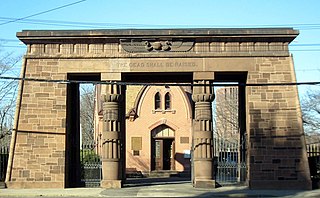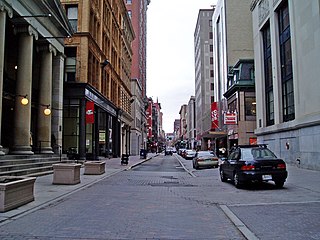Related Research Articles

The Ivy League is an American collegiate athletic conference, which comprises eight private research universities in the Northeastern United States. The conference's headquarters is located in Princeton, New Jersey. The term Ivy League is typically used beyond the sports context to refer to the eight schools as a group of elite colleges with connotations of academic excellence, selectivity in admissions, and social elitism. Its members are Brown University, Columbia University, Cornell University, Dartmouth College, Harvard University, Princeton University, University of Pennsylvania, and Yale University.

Yale University is a private Ivy League research university in New Haven, Connecticut. Founded in 1701, Yale is the third-oldest institution of higher education in the United States and one of the nine colonial colleges chartered before the American Revolution.

Timothy Dwight was an American academic and educator, a Congregationalist minister, theologian, and author. He was the eighth president of Yale College (1795–1817).

Yale College is the undergraduate college of Yale University. Founded in 1701, it is the original school of the university. Although other Yale schools were founded as early as 1810, all of Yale was officially known as Yale College until 1887, when its schools were confederated and the institution was renamed Yale University. It is ranked as one of the top colleges in the United States.

Benjamin Silliman was an early American chemist and science educator. He was one of the first American professors of science, at Yale College, the first person to use the process of fractional distillation in America, and a founder of the American Journal of Science, the oldest continuously published scientific journal in the United States.

Grove Street Cemetery or Grove Street Burial Ground is a cemetery in New Haven, Connecticut, that is surrounded by the Yale University campus. It was organized in 1796 as the New Haven Burying Ground and incorporated in October 1797 to replace the crowded burial ground on the New Haven Green. The first private, nonprofit cemetery in the world, it was one of the earliest burial grounds to have a planned layout, with plots permanently owned by individual families, a structured arrangement of ornamental plantings, and paved and named streets and avenues. By introducing ideas like permanent memorials and the sanctity of the deceased body, the cemetery became "a real turning point... a whole redefinition of how people viewed death and dying", according to historian Peter Dobkin Hall. Many notable Yale and New Haven luminaries are buried in the Grove Street Cemetery, including 14 Yale presidents; nevertheless, it was not restricted to members of the upper class, and was open to all.

Timothy Dwight V was an American academic, educator, Congregational minister, and President of Yale University (1886–1898). During his years as the school's president, Yale's schools first organized as a university. His grandfather was Timothy Dwight IV, who served as President of Yale College ninety years before his grandson's tenure.

Chinatown bus lines are discount intercity bus services in the United States, often operated by Chinese Americans, primarily Fujianese. They operate with lower overhead and lower fares compared to competing services. Destinations include most major cities as well as casinos popular with Asian Americans.

Theodore Dwight Woolsey was an American academic, author and President of Yale College from 1846 through 1871.

Mary Ellen Miller is an American art historian and academician specializing in Mesoamerica and the Maya.

Timothy Dwight College, commonly abbreviated and referred to as "TD", is a residential college at Yale University named after two presidents of Yale, Timothy Dwight IV and his grandson, Timothy Dwight V. The college was designed in 1935 by James Gamble Rogers in the Federal-style architecture popular during the elder Timothy Dwight's presidency and was most recently renovated in 2002. In 2021, TD won its Yale-leading 14th Tyng Cup, the championship prize for Yale's year-long intramural athletic competition among the fourteen residential colleges. The current Head of College is Mary Ting Yi Lui and the current Dean is Sarah Mahurin. Both are the first women to hold their respective positions.
Dwight School is a private independent for-profit college preparatory school located on Manhattan's Upper West Side in New York City. Dwight offers the International Baccalaureate curriculum to students ages two through grade twelve.

Elsie Sigel was a granddaughter of General Franz Sigel, and the victim of a notorious murder at the age of 19 in New York City in 1909.

Jill Lepore is an American historian and journalist. She is the David Woods Kemper '41 Professor of American History at Harvard University and a staff writer at The New Yorker, where she has contributed since 2005. She writes about American history, law, literature, and politics.
Marshall Green was an American diplomat whose career focused on East Asia. Green was the senior American diplomat in South Korea at the time of the 1960 April Revolution, and was United States Ambassador to Indonesia at the time of the Transition to the New Order. From 1969 to 1973, he was Assistant Secretary of State for East Asian and Pacific Affairs, and, in this capacity, accompanied President of the United States Richard Nixon during President Nixon's visit to China in 1972.

The New York metropolitan area is home to the largest and most prominent ethnic Chinese population outside of Asia, hosting Chinese populations representing all 34 provincial-level administrative units of China. The Chinese American population of the New York City metropolitan area was an estimated 893,697 as of 2017, constituting the largest and most prominent metropolitan Asian national diaspora outside Asia. New York City itself contains by far the highest ethnic Chinese population of any individual city outside Asia, estimated at 628,763 as of 2017.

The U.S. city of Providence, Rhode Island, was once home to at least two Chinatowns, with the first on Burrill Street in the 1890s until 1901 and then around Empire Street around the late 1890s in the southern section of the city. According to another source, the Burrill Street Chinatown was burned to the ground in 1901 by a "mysterious fire" caused by a kerosene stove.
Alessandra Comini is an American art historian and curator. She is University Distinguished Professor of Art History Emerita at Southern Methodist University in University Park, Texas. Proficient in music and languages as well as art history, Comini brought an interdisciplinary approach to her study of the arts in Austria and Germany at the turn of the 20th century, an approach particularly suited to the integrated art forms of fin-de-siècle Vienna.
Huie Kin was a Chinese-American Presbyterian pastor.
References
- ↑ Lui, Mary. "Mary Lui Yale University. Retrieved on 2 June 2016
- ↑ "New Timothy Dwight master named: historian Mary Lui", YaleNews , 14 April 2015. Retrieved on 2 June 2016.
- ↑ Wang, Victor. "For diverse faculty, admin roles hinder teaching" Yale Daily News , 4 March 2016. Retrieved on 2 June 2016.
- ↑ Wang, Monica. "At AACC, students discuss diversity", Yale Daily News , 13 November 2015. Retrieved on 2 June 2016.
- ↑ Siegel, Rachel and Wang, Monica. "Lui to succeed Brenzel as TD master", Yale Daily News , 14 April 2015. Retrieved on 2 June 2016.
- ↑ "New Timothy Dwight master named: historian Mary Lui", YaleNews , 14 April 2015. Retrieved on 2 June 2016.
- ↑ "Awards" Archived 2017-02-02 at the Wayback Machine Association for Asian American Studies. Retrieved on 2 June 2016
- ↑ "2011 Candidate Biographies", Organization of American Historians . Retrieved 2 June 2016.
- ↑ Ye, Joey. "Donation triples size of AACC library", Yale Daily News , 4 November 2015. Retrieved 2 June 2016.
- ↑ "New Timothy Dwight master named: historian Mary Lui", YaleNews , 14 April 2015. Retrieved on 2 June 2016.
- ↑ Bovsun, Mara. "The Chinatown trunk mystery", New York Daily News , 25 March 2008. Retrieved 2 June 2016.
- ↑ Lui, Mary. "Mary Lui" Yale University. Retrieved on 2 June 2016
- ↑ Lui, Mary (2005). The Chinatown Trunk Mystery: Murder, Miscegenation, and Other Dangerous Encounters in Turn-of-the-Century New York City, Princeton University Press, Princeton.
- ↑ Iu, Petula (Fall 2006). "The Chinatown Trunk Mystery: Murder, Miscegenation, and Other Dangerous Encounters in Turn-of-the-Century New York City (review)". Journal of Social History. 40 (1): 270–27. doi:10.1353/jsh.2006.0085. S2CID 142836127.
- ↑ Moon, Krystyn (April 2006). "MARY TING YI LUI. The Chinatown Trunk Mystery: Murder, Miscegenation, and Other Dangerous Encounters in Turn-of-the-Century New York City. Princeton: Princeton University Press. 2005. Pp. xii, 298. $29.95". The American Historical Review. 111 (2): 495–496. doi:10.1086/ahr.111.2.495.
- ↑ Yu, Renqiu (March 2006). "The Chinatown Trunk Mystery: Murder, Miscegenation, and Other Dangerous Encounters in Turn-of-the-Century New York City". The Journal of American History. 92 (4): 1462–1463. doi:10.2307/4485967. JSTOR 4485967.
- ↑ Lui, Mary. "Mary Lui" Yale University. Retrieved on 2 June 2016